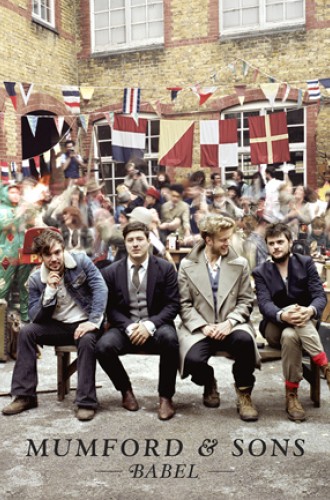Babel, by Mumford & Sons
Not since U2 has a pop music act with decidedly Christian leanings generated as much discussion, derision and delight as Mumford and Sons. “Little Lion Man” (from the double-platinum Sigh No More in 2010) may mark the first rock radio hit to drop the F-bomb prominently in the chorus. It’s often hard to tell whether the band is advancing folk music traditions or simply plundering them. And a legendary rock DJ recently dismissed the platinum-selling British quartet as “Hootie and the Blowfish with banjos.”
Yet listeners eager for an alternative to hipster pessimism and hit radio stagnation are sticking by the Mumford boys—and finding some substance there. “I Will Wait” is a sublime anthem that would make Bono proud, nothing less than a pop music psalm that aches for grace: “These days of dust, which we’ve known / Will blow away with this new sun / But I’ll kneel down, wait for now / And I’ll kneel down, know my ground.”
Given that high-water moment, the question remains whether Mumford and Sons can sustain such thrills over an entire album. Enter the danger sign: Caution, banjos ahead. This much banjo is an unusual thing in rock music; it can sound pretty corny. And Mumford and Sons isn’t a group to experiment by running the instrument through sonic filters. So does Babel break a mold? Or is this a case of candy-coated excess? Indeed, the title track sounds like a folkie retread of Styx’s “Fooling Yourself,” and it won’t fool many listeners.
But give Mumford and Sons credit for taking a high road lyrically. Songs like the sprightly “Whispers in the Dark” succeed as explicit, startling declarations of belief: “I’m a cad but not a fraud / I set out to serve the Lord.” A cheeky response to Mumford’s critics? Perhaps. And many musical highlights reside on the softer side. On “Ghosts That We Knew,” muted banjo picking forms an interesting (if at times strident) contrast to Marcus Mumford’s vocal stabs and growls. And a cover of Simon and Garfunkel’s “The Boxer” rides high on the expressive Dobro playing of Jerry Douglas, as well as on a chorus reimagined as a London pub sing-along.
Recorded mostly live in the studio, Babel has enough substance and spontaneity to warrant repeat listens. It may not be authentic folk music, but it branches out with gusto—and it blooms much more often than it wilts. Does the banjo get tedious? At times, yes. But countless discs using electric guitars get stuck in sameness. What puts Babel over the top? Credit its strong tailwind, its spiritual thrust.





